Another James Bond Christmas
007 Peaks with On Her Majesty's Secret Service (1969)
Resolved: To not watch the last five minutes of On Her Majesty’s Secret Service ever again. And to cover eyes where clips show up on You Tube. Some say James Bond ended with this one. I would not have agreed before, but now sort of do. In a world of my choosing, On Her Majesty’s Secret Service would finish with 007 and Tracy headed off for their honeymoon, followed by the title, James Bond Will Not Be Back. Come back for what? Diamonds Are Forever, then a flock with Roger Moore, downhill further from there? Seems to me the series summitted with On Her Majesty’s Secret Service. They would not come near its quality again. A strong opinion I know as later Bonds remain enjoyable, but this one … well, it is the best, as in Bond and Beyond, whatever hype pumped later Bonds. I wonder how many rose so high as OHMSS by estimation of 007 fans, plus casual viewers not necessarily disposed to the now sixty-year cycle. George Lazenby is easy getting used to today where he was not in 1969. I boycotted On Her Majesty’s Secret Service then because it had him instead of Connery, a foolish gesture on my part. It was the mid-80’s before a visiting collector brought down his 16mm scope print and schooled me. Initial pass on OHMSS had indeed been a gross error.
Lazenby is entrenched enough in my affection to push an imagined Sean Connery right out of qualification. I don’t think the latter would have done so effectively this stage of Bond as Lazenby so effortlessly did. I say effortlessly because GL got through the picture, by his own reckoning, on sheer nerve, confident he had the goods and not needing more than a single take, so the actor said. And all the more remarkably … he wasn’t even an actor then, but a male model and TV commercial pitchman. Never mind Daniel Craig playing the “young, inexperienced” Bond in Casino Royale. Lazenby did that to nines when he was but 28, all the better because he really was inexperienced … and as Lazenby admitted, quite immature. Here was ideal, if inadvertent, casting. No one, including, and especially, Connery, could have touched what George Lazenby achieved here. Never had we, or would we, empathize so with James Bond. He is vulnerable in an earnest, believable way, not as fashionable dark wanderings Craig and self-consciously edgy writers later imposed. Lazenby took it on the chin from high-trained co-stars who let him know daily how green he was, so yes, he responded on arrogant, defensive terms. At 28, I dare say I would have behaved worse. Lazenby recalls well the mistakes he made. It doesn’t take much prodding for him to recite them.
Becoming Bond (2017) was a pleasing profile that told his story, hilarious at times. George certainly does not take himself seriously, whatever his conduct fifty-two years ago. There’s a You Tube interview with Diana Rigg, circa six-seven years back, where she said he was “ill-equipped’ to act, that “I was there to steer him through and give it some gravitas.” Problems with Lazenby were not forgot, at least by her. “He was really difficult … throwing his weight around … He was definitely the architect of his own demise as a film star.” Rigg acknowledged that On Her Majesty’s Secret Service was by now a better regarded film, although she did not find it so in hindsight. What’s interesting is the fact she was relied upon to coach Lazenby, at least to a point where she lost patience with him. The same seems to have happened with director Peter Hunt, who ultimately communicated with his James Bond through intermediaries. After more than a half-century, it’s hard to know fully what went on, most principals and crew since gone, accounts a veritable Rashomon of mixed memories.
If Lazenby failed to appreciate his role at the time, there was Sean Connery who had come to a same impasse, having dropped out after a contracted five and not willing to re-up for On Her Majesty’s Secret Service. It was said that Saltzman and Broccoli were still on planes to-from Connery’s home just three weeks ahead of a start date, begging him still to come aboard and spare them having to use a neophyte. Tally of Bonds and how each felt toward the role is instructive: Connery grew to resent limits 007 placed upon him, Lazenby let it slip away through miscommunication and poor judgment, Roger Moore saw a good thing, was comfortable within the Bond family, and did outside pictures successfully. Timothy Dalton may have had mixed emotions, but was replaced before he could much express them. Pierce Brosnan loved Bond since a lad and longed to play him, would still be doing so today had makers let him, was bitter to be turned out. Daniel Craig seemed morose toward the part from a start, certainly played the character in that mode. It got tedious well before he announced quitting. I suspect five, let alone seven Bonds (as Moore did) would be enough to tax any actor’s endurance, especially with risk and general discomfort always a factor, like boys coming home every day from play with skinned knees or sprains. How long would it take to get over the novelty of being James Bond? And how much pay would you need to carry on doing something you had grown to dread?
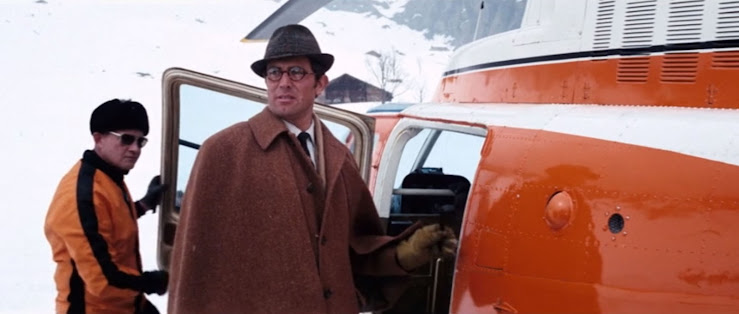 |
| This Is Cinerama? It Might As Well Be For Scenery and Movement OHMSS Captures |
It always struck me that James Bond was sort of a reprieve for Cinerama’s discarded travelogue format. No series took us so far afield, each a virtual trip around the world as it were. As stories got flimsier and more repetitive, the sights were hopped up to compensate; just think of places you would see even if there wasn’t much by way of story to look at, James Bond a must to watch on very wide screens so as to drink in miracles of nature and man’s enhancement of it. From twenty-five in the series so far, only five are not anamorphic, which imagine what damage seventies and eighties television, then early VHS tape, inflicted upon visuals. 007 would do or die upon narrative and cropped action alone for this long haul, relieved only when new-introduced laser discs rescued the group from full-frame oblivion. Now we have the lot on 4K, accessible via streaming, and to watch them on a large enough home screen gives an almost three-panel effect as with Cinerama when it opened windows to the world. Even a blandest Bond can look spectacular where proper presentation fills the void.
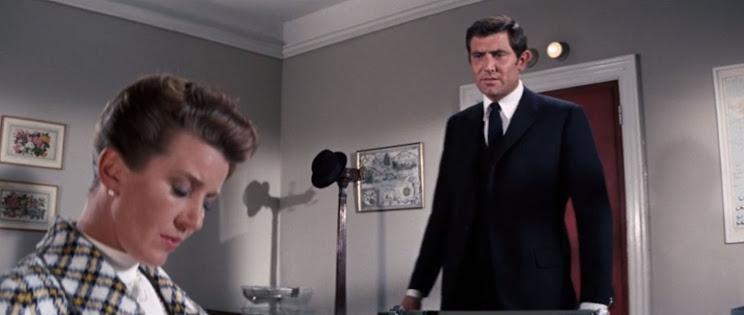 |
| Sharp Reproof From M Causes Hypersensitive 007 To Resign |
Who was James Bond by 1969? He was, by public accord, Sean Connery, free by then to do Shalako, The Red Tent, and The Molly Maguires, not ten cents of boxoffice between them. We saw Shalako in 1968 and wondered if Sean had gone off his nut. This was progress from 007? You Only Live Twice had been dry-gulched by Casino Royale, the latter so poor it might have turned viewers off Bond for keeps, at least those fooled into thinking it was part of the official series. Worse were YOLT receipts down from expectation Thunderball created, and now came On Her Majesty’s Secret Service crippled by the absence of Connery. The “spy craze” was meanwhile come and gone, most pretenders to Bond washed ashore and forgot. Less imitative, but knife-pointed at ethos of 007, was espionage told on harsh terms, drab and hopeless means by which any man ekes a living, particularly in the UK where austerity seemed not to have relaxed, at least so far as this new wave of spy downers told it. These cared little to compete with Bond, were in fact designed as anti-Bond, each a corrective to fantasy he represented. Some of us sat for The Deadly Affair in 1967 (on a combo with a Hammer at the Liberty), and yes, it did seem deadly then, years needed for me to grow into it. Same for the Harry Palmer group and The Spy Who Came In From The Cold.
 |
| Bond's Own Office Is No Lap of Luxury |
On Her Majesty’s Secret Service took these into account by letting Bond be more the public servant taking sharp orders from M and even quitting his job in pique, this segment among most fascinating in all annals of 007. For a first and only time, we see Bond retreat from M’s office to his own, a four-wall nothing with passed down furniture, a corner file cabinet, and a nondescript bulletin board. Bond/Lazenby has come here to clear out his desk, collect effects, call 007 a day. We sense fully that luxury lifestyle has been mere pose, a means of getting close to the action and enemies. And yet Bond gambles on his own time at a posh hotel, and always wins. This was case, in fact, for a first scene where the master spy was introduced, Connery as 007 in Dr. No. He wins enough there to surely surpass whatever salary the British government tenders, and I often wondered why Bond did not chuck the Service altogether and become a pro gambler. Surely it would be more remunerative, less dangerous at the least. Majesty’s spartan office brings Bond very much in line with Harry Palmer, who was always spoiling for a raise or being belittled by bosses. We’d not expect Sean Connery to occupy a space like this even for a moment, but George Lazenby? Yes, that makes sense, him a beginner Bond not fully in command of his impulse and emotion, a Bond still being tested. It anticipates too the serious involvement to come with Tracy, and a marriage that will result. I don’t think we could have believed any of this from Connery.
 |
| Raise The Limit? I Have No Objection. |
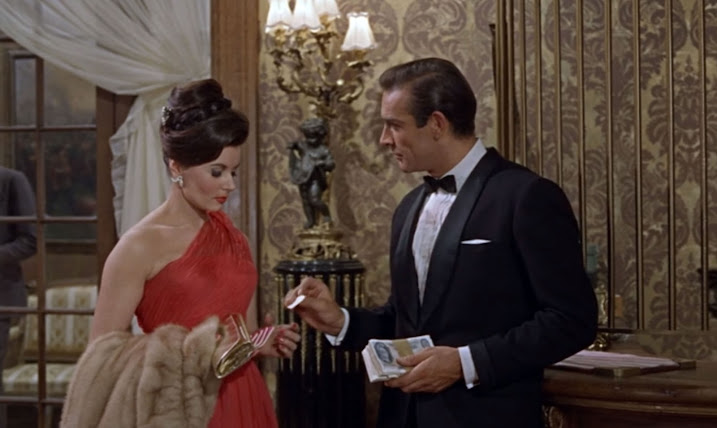 |
| All This For a Night's Recreation ... So Why Be a Secret Agent? |
On Her Majesty’s Secret Service can be treasured for supplying insight to what for this one occasion would be an alternate Bond, not merely an alternate actor playing him. Talk about bosses living high as drones go humble, On Her Majesty’s Secret Service has Bond calling on M at his palatial home, “Quarterdeck,” with its ship’s bell at the door to herald arrivals. Don’t know if 007 called ahead, but he is not received like a guest, M occupied with his butterfly collection, making no effort to welcome his employee (what, no drink offered, nor invitation to sit among a roomful of plush furniture?). M lives like a country squire --- did he inherit wealth? --- because surely the Navy did not retire him to such elegance. I never had the impression that James Bond was highly paid. Chances are his salary level was not much above Harry Palmer’s. Wish we could have seen more of James Bond’s own residence during the Connery/Lazenby era, that is, the sixties. I bet it would have been little more than the flat lived in by the two government investigators looking into 1963's Children of the Damned. Now there was stripped down truth of what daily life looked like in sixties Britain, at least as I imagine it.
 |
| Here Is Where M Lives ... |
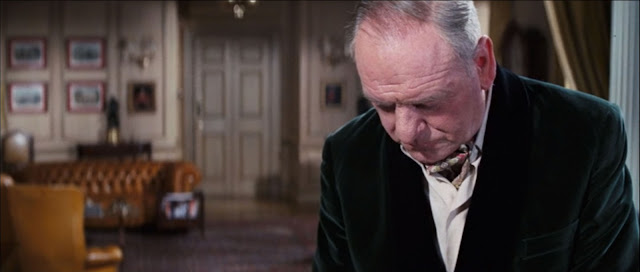 |
| ... He Collects Butterflies. |
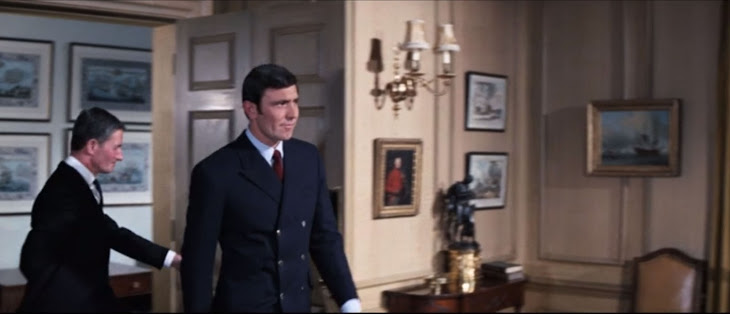 |
| Bond Enters Into What Must Have Been Unaccustomed Splendor For Him. |
On Her Majesty’s Secret Service to surprise of few fell way short of what You Only Live Twice earned, $9.1 million in domestic rentals less than half of what YOLT took. Worldwide total of $24.8 million was still profitable, but it was a longer haul getting there, according to Eon chief Michael Wilson in a look-back. Both Diamonds Are Forever and Live and Let Die would dwarf Majesty’s boxoffice as well, leading to diminished stature for OHMSS that would last decades. Rediscovery and reevaluation came slowly. A Bond fan could be a rebel Bond fan for choosing On Her Majesty’s Secret Service as a best of 007. You Tube is rife with modern-day appreciations, virtually all from fans who were not there for 1969 dates but came to OHMSS via television or other home formats. One fifty-minute YT discussion has two who saw the film together as teenagers for the first time … on laser disc. They even hold up the record album-like sleeve. Varied comments over You Tube output describe “problematic” aspects of OHMSS, it being “filled with moments that are unacceptable now.” Still they like it, if somewhat skittish for saying so. On Her Majesty’s Secret Service might indeed be the Bond to modernly command a most dedicated following, fine by me as it increasingly plays finest of the so-far bunch.

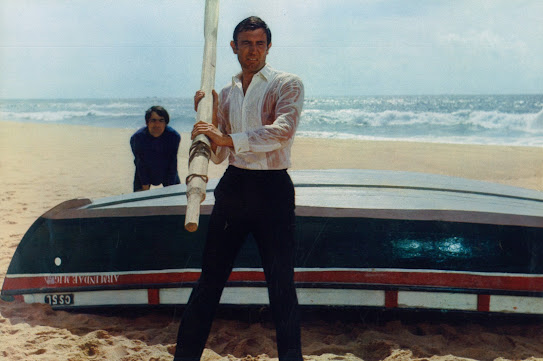
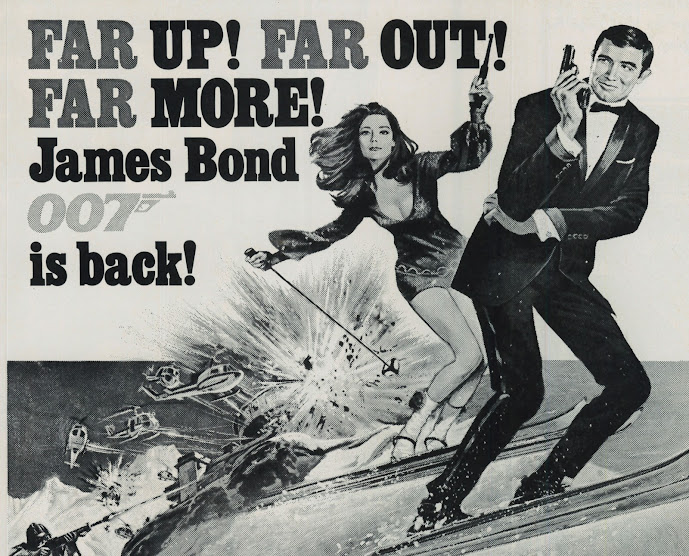
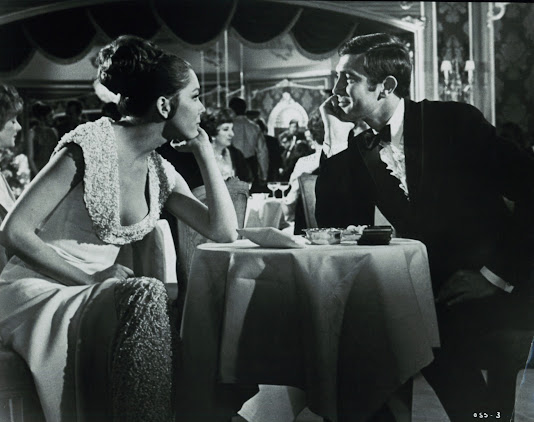

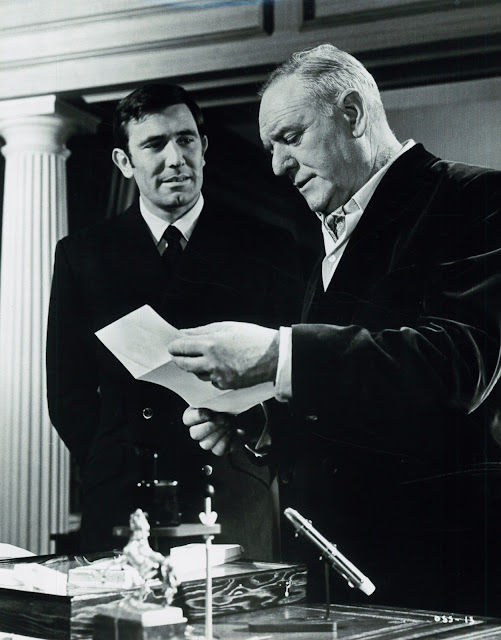

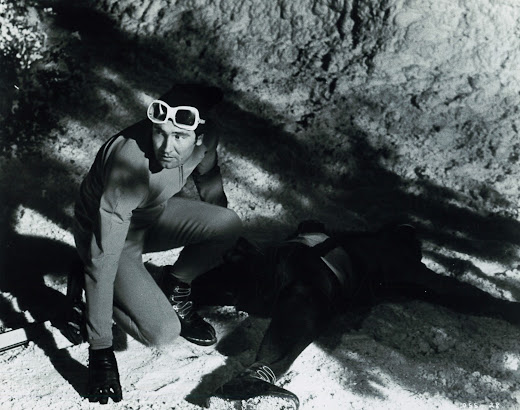

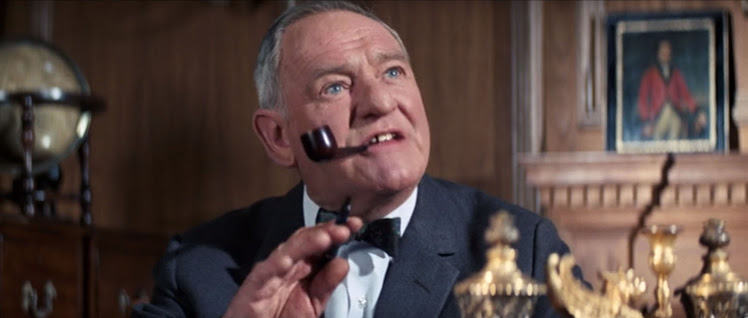
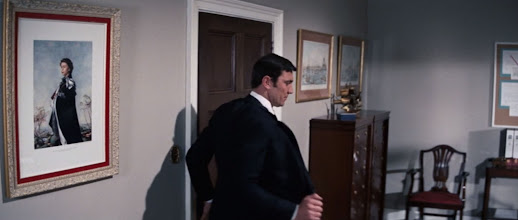
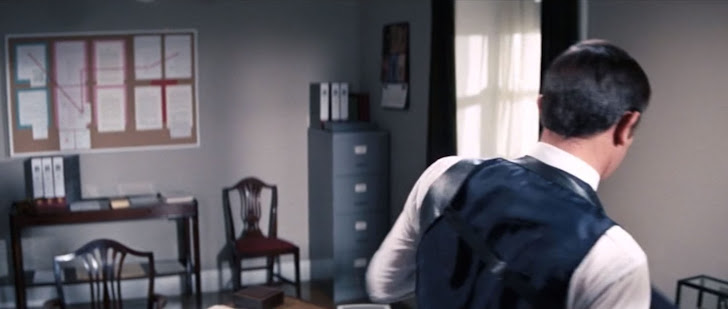


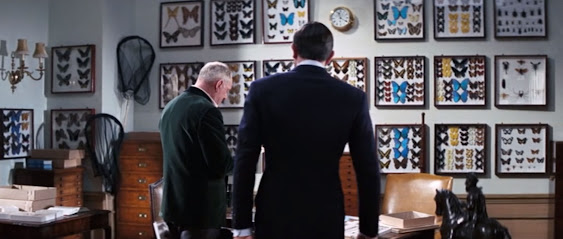
15 Comments:
Old enough to remember when the holiday season was when Big Movies appeared: The musicals, the Disney animations, the spectacles. The full tab page Sunday newspaper ads included ticket order forms. I'm likely misremembering, but I recall the rest of the year offered lower-budget (by comparison) fare until the 70s advent of the Summer Blockbuster.
One plot issue I had with OHMSS: After initially falling in love, Bond's assignment takes him to an alpine retreat where he casually and cheerfully rogers his way through a bevy of heiresses (nominally in the line of duty). Then he reconnects with Tracey and it's a romance again.
The credits include images from earlier Bonds, while another sequence offers a montage of musical quotes. They're really being emphatic that this is the same James Bond, despite the change of actors. When Connery returned for "Diamonds Are Forever", he's tracking Blofeld (played by a new actor) to avenge Tracey, again insisting it's the same Bond. Finally Roger Moore would visit Tracey's grave, yet again insisting the same Bond has been having all these adventures. When Dalton arrived, there was a sense of dealing with history by mostly ignoring it, the way Archie Andrews and his friends remain in high school for decades and simply don't bring up memories of jitterbugging or Beatlemania.
They had different actors playing the role of Blofeld throughout the series, too. That always bugged me a bit as a kid.
Whenever I re-visit any of the the Bond movies featuring Blofeld, even those films where only Blofeld's voice as Number 1 is heard, I sometimes imagine Bob Hope playing the role of Blofeld, and playing the role entirely straight.
I fancy that bit of casting would have made this series even more exceptional than it has proven to be.
I was too young to have seen the original Connery Bonds or OHMSS in movie theaters. My first exposure to them was on ABC television.
I distinctly remember seeing OHMSS and not being impressed. It seemed so confusing!
It's only later I discovered that ABC had done an extensive re-edit of the movie to spread it over two nights and put actions sequences in the first half.
Here's a reconstruction of ABC's edit, using a fans audio recording of the broadcast as the basis. They even put in an American, narrating the story as "Bond", to try to make their edit coherent.
https://youtu.be/mCAV0wpO4mo
Since then, OHMSS has turned into one of my favorite Bond films. I've even screened it for non-Bond fans who enjoyed it.
The first Bond film I was allowed to see on my own. Other than a Louis Armstrong song on the soundtrack, I have almost no recollection of the movie at all.
I think the reason why the movie is more popular with younger audiences is that they don't have the emotional connection to the Connery Bonds. They're looking at it as a stand-alone and not the first without the "real" James Bond. The same way they love, say, certain Paul McCartney records that irked Beatles-obsessed critics in the 1970s. It all comes down to objectivity.
Dug out my Ultimate Collection DVD. Interesting factoid: The film was meant to end with Bond and Tracy riding away from their wedding, with the following scene becoming the opening of "Diamonds Are Forever". Had Lazenby stuck around, would that have meant a less frivolous script? A more emotionally loaded rematch between Bond and Blofeld?
Coincidence or intentional reference: The first Austin Powers film had vestiges of emotion in Powers missing the 1960s and finally falling in real love with his modern heroine. The next film opens with her turning out to be an evil fembot who explodes, and without missing a best the happily single Powers and the franchise abandon everything other than pure desperate gaggery -- as Bond came close to doing.
One more odd memory: When it showed on ABC (and elsewhere?), a somber pre-film disclaimer declared the Red Cross did not condone the use of their name. In the film, Bond and friends raid Blofeld's stronghold after identifying themselves as a Red Cross relief mission.
It was the last day of 1969. My father, having suffered for too long, died of stomach cancer that afternoon. Finally, to get out of my house of sorrow, I went to the New Years Eve midnight showing (in State College) of OHMSS and was mercifully occupied for two glorious hours.
I consider it a huge missed opportunity that George Lazenby did not return in the role. It remains one of my favorite Bond films.
If not for a conflict in scheduling, Roger Moore (he had another season of THE SAINT inked) would have starred as Bond in ON HER MAJESTY`S SECRET SERVICE. Frankly, I wish it had happened. I do not like Lazenby in the role. Shame they didn`t bring back Savalas as Blofeld in DIAMONS ARE FOREVER.
Becoming Bond (2017) is fun, lots of fun. Thanks for turning me on to it (and so much more) through these posts.
I saw OHMSS in Hollywood in a BIG Hollywood theatre when it came out. Liked it.
Now you have me getting ready to re-watch it.
I like Daniel Craig in the role.
Beowulf, sorry to hear your father passed through that Hell. Losing a parent is hard always.
Thank you, Reg.
I think Moore in OHMSS would have been terrific. Though dismissed as a lightweight, he is really the only Bond to provide needed gravitas, when called for. (I sneer at Craig -- he is so one-note as to be absurd.)
My sainted husband sat through a Bond marathon with me a few years ago -- Dr. No all the way through to Craig's Casino Royale. Not a fan of the material, his verdict was: the only one that was a 'real' movie was OHMSS.
As for Hope as Blofeld -- I have come to the conclusion that there was nothing he could not do, so it probably would've worked fine.
OHMSS was the first Bond film I ever saw(I was 10 years old and my Mum took me). I had no idea this was a new Bond and I thought I was watching Connery!
DBenson wrotes: "When Dalton arrived, there was a sense of dealing with history by mostly ignoring it."
Not quite. OHMSS is directly referenced in "Licence to Kill," Dalton's second film. Felix Leiter's wife Della throws Bond her garter; he shakes his head, gives a sad smile and walks off. "Did I say something wrong?" asks Della. "He was married once," says Felix, "but it was a long time ago." What later happens to Della drives Bond on a mission of vengeance, undoubtedly because it echoes the events of OHMSS.
Incidentally, the excellent book The Making of OHMSS dispels several myths surrounding the production. The film was not meant to end with Bond and Tracy riding away from their wedding---a sad ending was in every version of the script. Nor was Roger Moore in serious consideration for the role (and I don't think he would have done well--he would have looked flimsy and lightweight alongside Diana Rigg). The producers wanted to hire an unknown and mold him into a new Connery.
The critic Charles Taylor called OHMSS the ending of the first cycle of Bond films, which seems apt to me. After Connery left the producers let Peter Hunt and Richard Maibaum have their way. They were free to make a film that was faithful to one of Fleming's best novels, a film free of the excessive gadgetry and bloated spectacle that had overtaken the series before and after 1969. Hunt's direction and editing (with John Glen) were almost avant-garde for an action film in 1969 and still pack a punch.
Incidentally, the latest Bond film, "No Time to Die," is full of references to OHMSS, including direct musical quotes. The producers and Craig intended this film to be Craig's version of OHMSS, but it's a bloated, strained, overlong homage. OHMSS will indeed remain the crown jewel of the series.
I'm an enormous fan of the series, which has its ins and outs and whathaveyous; Roger Moore acquits himself in the most serious of his labors, For Your Eyes Only, and Octopussy is as smashing as it is silly. And given the unevenness and troubles plaguing the 21st century Bonds, Craig has my admiration. But OHMSS was always the best of the series and has remained so--and all the tributes to it in No Time To Die proves that it's finally getting the respect it deserves. I was 12 1/2 when I saw it, first show of the day on New Year's Day 1970 at the Academy Theater in Pasadena, even as they were sweeping up the rubbish of the Rose Parade outside. It made me a film critic. To quote Evelyn Ankers on the subject of GWTW, "I felt like I'd never seen a movie before." If Lazenby is sometimes overwhelmed as an actor, good! It's fitting for an adventure in which he is really up against it, and comes home empty handed.
Had the film shown a grim and mourning Bond returning to his little office after Tracy's death as its fade-out, it could have stolen back some of the thunder those drab 1960s spy films with Burton and Caine had taken with their so-called "realism".
For me, John Barry never got more deeply inside a drama than he did in OHMSS. The first notes of the main theme (no lyrics, just an intense orchestral piece, another series novelty) still give me chills.
Post a Comment
<< Home